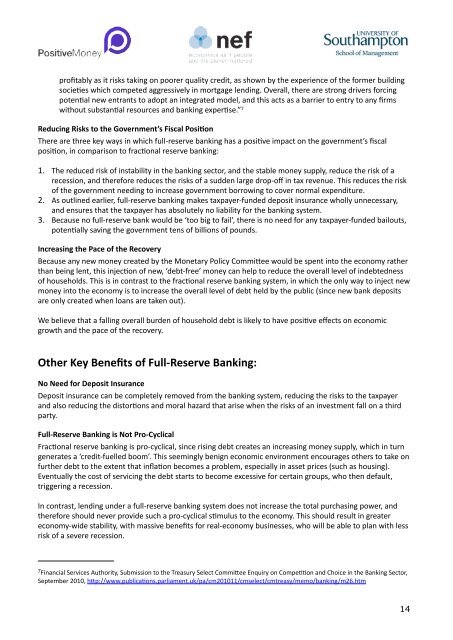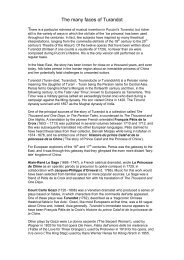NEF-Southampton-Positive-Money-ICB-Submission
NEF-Southampton-Positive-Money-ICB-Submission
NEF-Southampton-Positive-Money-ICB-Submission
You also want an ePaper? Increase the reach of your titles
YUMPU automatically turns print PDFs into web optimized ePapers that Google loves.
profitably as it risks taking on poorer quality credit, as shown by the experience of the former building<br />
socieGes which competed aggressively in mortgage lending. Overall, there are strong drivers forcing<br />
potenGal new entrants to adopt an integrated model, and this acts as a barrier to entry to any firms<br />
without substanGal resources and banking experGse.” 7<br />
Reducing Risks to the Government’s Fiscal PosiPon<br />
There are three key ways in which full-‐reserve banking has a posiGve impact on the government’s fiscal<br />
posiGon, in comparison to fracGonal reserve banking:<br />
1. The reduced risk of instability in the banking sector, and the stable money supply, reduce the risk of a<br />
recession, and therefore reduces the risks of a sudden large drop-‐off in tax revenue. This reduces the risk<br />
of the government needing to increase government borrowing to cover normal expenditure.<br />
2. As outlined earlier, full-‐reserve banking makes taxpayer-‐funded deposit insurance wholly unnecessary,<br />
and ensures that the taxpayer has absolutely no liability for the banking system.<br />
3. Because no full-‐reserve bank would be ‘too big to fail’, there is no need for any taxpayer-‐funded bailouts,<br />
potenGally saving the government tens of billions of pounds.<br />
Increasing the Pace of the Recovery<br />
Because any new money created by the Monetary Policy CommiOee would be spent into the economy rather<br />
than being lent, this injecGon of new, ‘debt-‐free’ money can help to reduce the overall level of indebtedness<br />
of households. This is in contrast to the fracGonal reserve banking system, in which the only way to inject new<br />
money into the economy is to increase the overall level of debt held by the public (since new bank deposits<br />
are only created when loans are taken out).<br />
We believe that a falling overall burden of household debt is likely to have posiGve effects on economic<br />
growth and the pace of the recovery.<br />
Other Key Benefits of Full-‐Reserve Banking:<br />
No Need for Deposit Insurance<br />
Deposit insurance can be completely removed from the banking system, reducing the risks to the taxpayer<br />
and also reducing the distorGons and moral hazard that arise when the risks of an investment fall on a third<br />
party.<br />
Full-‐Reserve Banking is Not Pro-‐Cyclical<br />
FracGonal reserve banking is pro-‐cyclical, since rising debt creates an increasing money supply, which in turn<br />
generates a ‘credit-‐fuelled boom’. This seemingly benign economic environment encourages others to take on<br />
further debt to the extent that inflaGon becomes a problem, especially in asset prices (such as housing).<br />
Eventually the cost of servicing the debt starts to become excessive for certain groups, who then default,<br />
triggering a recession.<br />
In contrast, lending under a full-‐reserve banking system does not increase the total purchasing power, and<br />
therefore should never provide such a pro-‐cyclical sGmulus to the economy. This should result in greater<br />
economy-‐wide stability, with massive benefits for real-‐economy businesses, who will be able to plan with less<br />
risk of a severe recession.<br />
7 Financial Services Authority, <strong>Submission</strong> to the Treasury Select Commi:ee Enquiry on CompeAAon and Choice in the Banking Sector,<br />
September 2010, h:p://www.publicaAons.parliament.uk/pa/cm201011/cmselect/cmtreasy/memo/banking/m26.htm<br />
14



